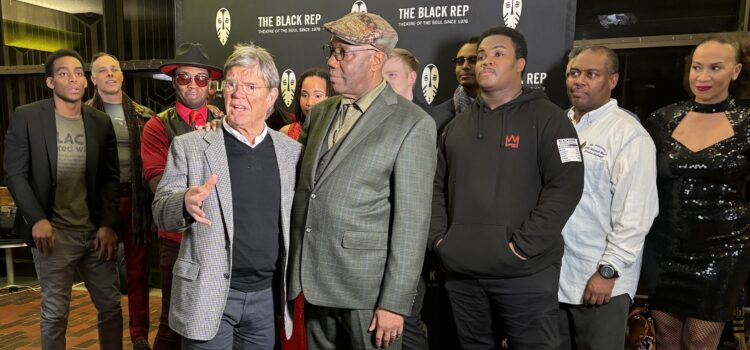By Lynn Venhaus
In 1965, the conflict between Dr. Martin Luther King Jr. and President Lyndon Johnson regarding voting rights came to a head because of escalating violence. On the streets of Selma, Alabama, the struggle to end racial discrimination was real. The drive for equality that resulted in the historic march from Selma to Montgomery and the hard-fought triumph that was the Voting Act Rights is depicted in a new historical drama written by British playwright Paul Webb.
The St. Louis Black Repertory Company hosted British playwright Webb for the world premiere of “Hold On!” that began with previews Jan. 10, opening night was Jan. 12, and the show ran Wednesday through Sunday until Jan. 28 in the Edison Theatre on the campus of Washington University in St. Louis. It was the kickoff to their 47th mainstage season and directed by founder and producing director Ron Himes.
“We’re delighted to be producing this exceptional world premiere and we’ve pulled together an extraordinarily talented group of creatives to tell this story, It’s a great way to kick off our 47th Season,” Himes said.
Webb. who wrote the screenplay for the 2014 film “Selma,” was first inspired to write a play focused on the historic events in the Civil Rights Movement that led to the Voting Rights Act of 1965, a year after the landmark Civil Rights Act was passed, and after King won the Nobel Peace Prize.
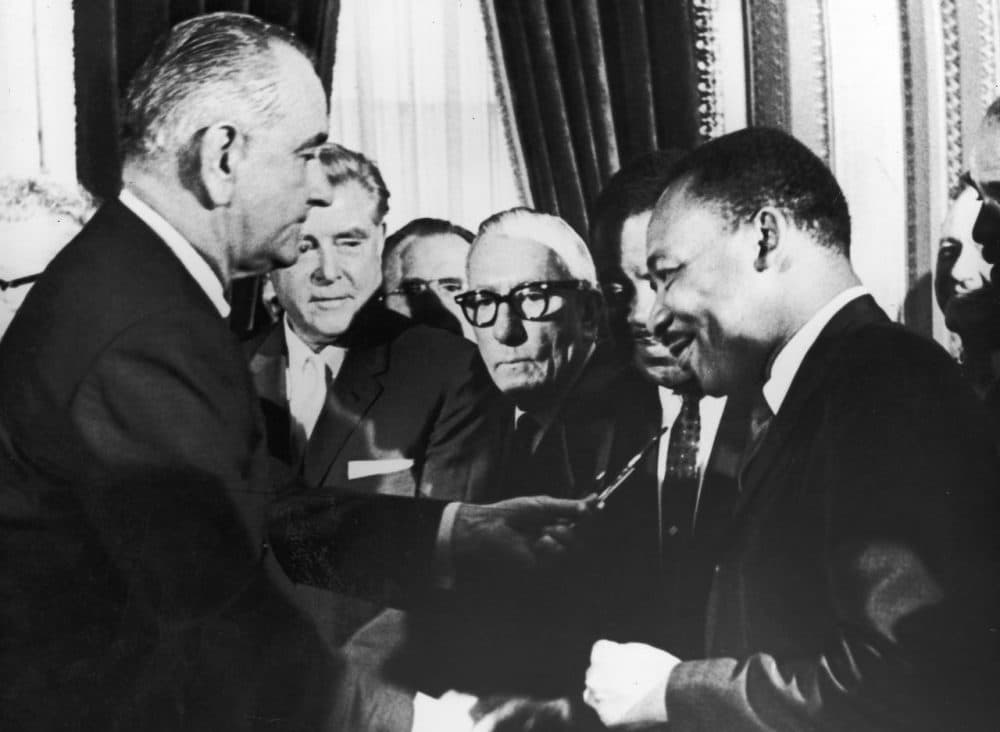
“What I came to realize was that the Selma voting rights campaign was the pinnacle of the careers for two extraordinary, although extraordinarily different, leaders,” Webb says.
Webb said he has been fascinated with American culture since childhood, and told a group of us at the opening night party about hitchhiking across America for six months. He saw how complicated race relations were in the South. He was intrigued by President Johnson’s efforts during the civil rights area, and his relationship with King. The importance of the demonstrations in Selma was a way to develop the story he wanted to pursue. .
Webb’s other works include “Four Knights in Knaresborough” about the assassination of Thomas Becket, and the BET mini-series “Madiba” about the life of Nelson Mandela.
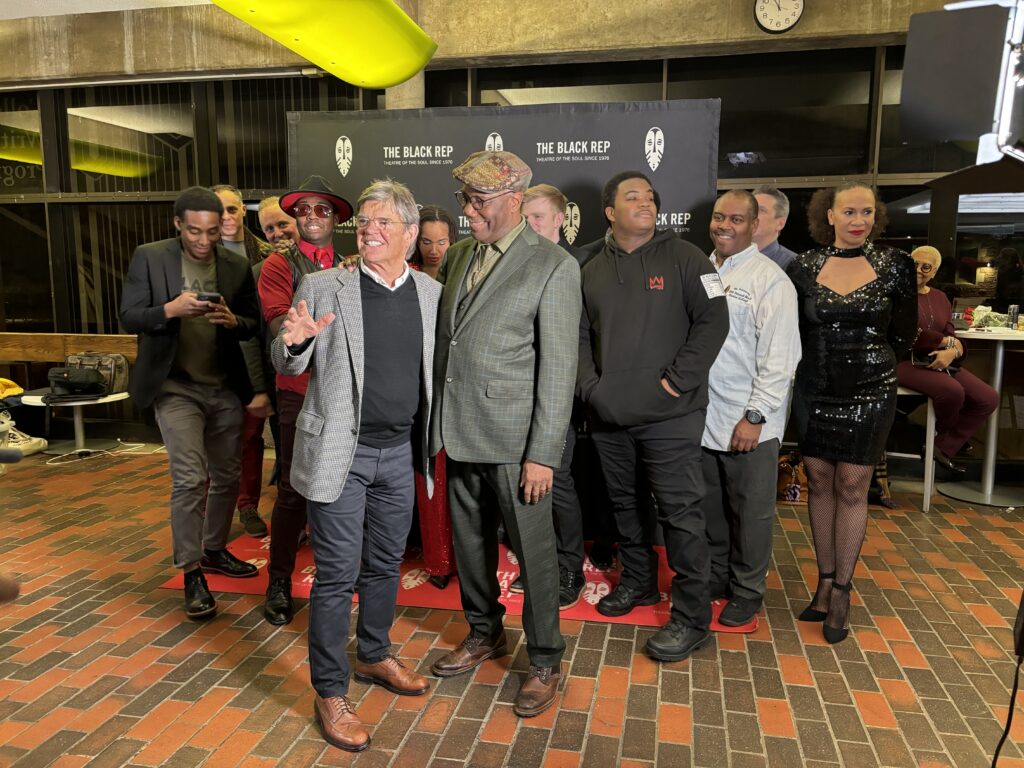
Conversations with the Webb were included throughout the opening weekend, at the Jan. 11 preview performance at 7 p.m., followed by a post-show discussion, and after opening night Jan. 12, there was a post-show reception and a meet and greet. On Sunday, Jan. 14, there was a pre-show discussion at 2 p.m. before the 3 p.m. matinee performance.,
In 1957, King said: “So long as I do not firmly and irrevocably possess the right to vote, I do not possess myself. I cannot make up my mind; it is made up for me.”
In the 1960s, Americans debated what the “equal protection of the laws” in the 14th Amendment meant. Did the Constitution’s prohibition of denying equal protection always ban the use of racial, ethnic, or gender criteria in an attempt to bring social justice and social benefits?
In June 1963, President John Kennedy asked Congress for a comprehensive civil rights bill. This was after resistance to desegregation and the murder of Medgar Evans, a civil rights activist in Mississippi, who was fatally shot on June 12.
After Kennedy’s assassination in November, President Johnson took up pushing for it, and the Civil Rights Act of 1964, which prohibits discrimination on the basis of race, color, religion, sex or national origin, passed. That forbade using race and sex as reasons in hiring, promoting and firing, and strengthened the enforcement of voting rights and desegregation of schools.
Then, Johnson introduced the Voting Rights Act to Congress in March 1965, the same month that voter registration protests began in Selma.. The violence there added pressure on Congress to act, and the bill passed in four months.
To further learn about King’s journey, here are some resources:
https://kinginstitute.stanford.edu/king-resources/major-king-events-chronology-1929-1968
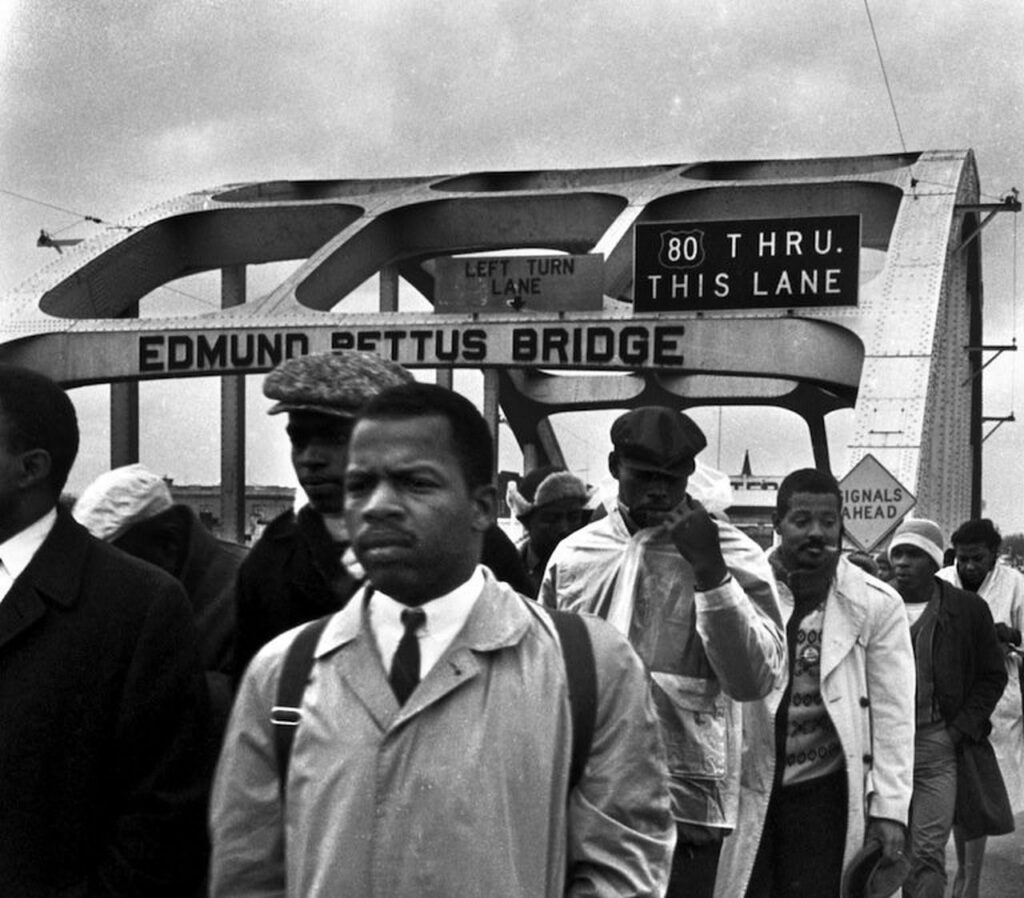
Fifty-nine years ago, Selma became the battleground for Black suffrage, and. the Edmund Pettus Bridge, the site of the brutal Bloody Sunday beatings of civil rights marchers, is now a national historic landmark. Because the attacks were televised, public support for the activists grew, and marches continued for voting rights.
For more information about the landmarks in the historic civil rights efforts, visit the Civil Rights Trail: https://civilrightstrail.com/
The protections that King and his supporters fought for are under actual threat today, with attempts at voter suppression making the Voting Rights Act vulnerable. The Freedom to Vote Act addresses voter registration and voting access, election integrity and security, redistricting, and campaign finance. (Sources: https://www.congress.gov/bill/117th-congress/senate-bill/2747 and https://www.brennancenter.org/freedom-vote-act
Specifically, the bill expands voter registration (e.g., automatic and same-day registration) and voting access (e.g., vote-by-mail and early voting). It also limits removing voters from voter rolls.
Next, the bill establishes Election Day as a federal holiday.
The bill declares that the right of a U.S. citizen to vote in any election for federal office shall not be denied or abridged because that individual has been convicted of a criminal offense unless, at the time of the election, such individual is serving a felony sentence.
The bill establishes certain federal criminal offenses related to voting. In particular, the bill establishes a new criminal offense for conduct (or attempted conduct) to corruptly hinder, interfere with, or prevent another person from registering to vote or helping someone register to vote.
Additionally, the bill sets forth provisions related to election security, including by requiring states to conduct post-election audits for federal elections.
The bill outlines criteria for congressional redistricting and generally prohibits mid-decade redistricting.
The bill addresses campaign finance, including by expanding the prohibition on campaign spending by foreign nationals, requiring additional disclosure of campaign-related fundraising and spending, requiring additional disclaimers regarding certain political advertising, and establishing an alternative campaign funding system for certain federal offices.
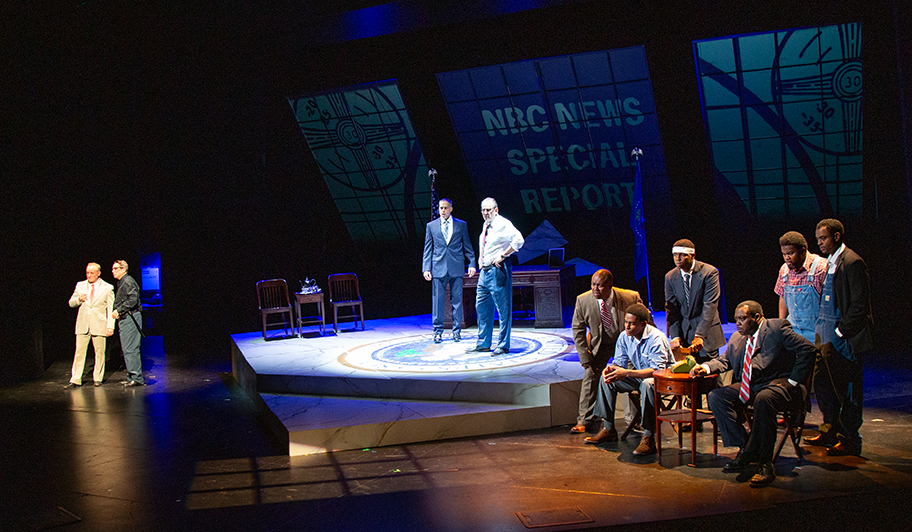
The Black Rep’s 47th season will continue with “Fly” (Feb. 14 to March 10) in WashU’s A.E. Hotchner Studio Theatre, followed by “Wedding Band” (March 13-31) at COCA, 6880 Washington Ave., and “Timbuktu!” (May 15 to June 9) in Edison. The season will conclude with “King Hedley II” (June 19-July 14), also in Edison.
Single tickets are now available through the Box Office, in person, or at (314) 534.3807. Reduced pricing is available for seniors, educators, students, and groups of 12 or more. Season 47 subscriptions remain on sale at TheBlackRep.org.
Support for The Black Rep’s 47th Main Stage Season comes from The Berges Family Foundation, The Black Seed Initiative, Caleres, Missouri Arts Council, the Regional Arts Commission, Rogers-Townsend, The Shubert Foundation, and the Steward Family Foundation.
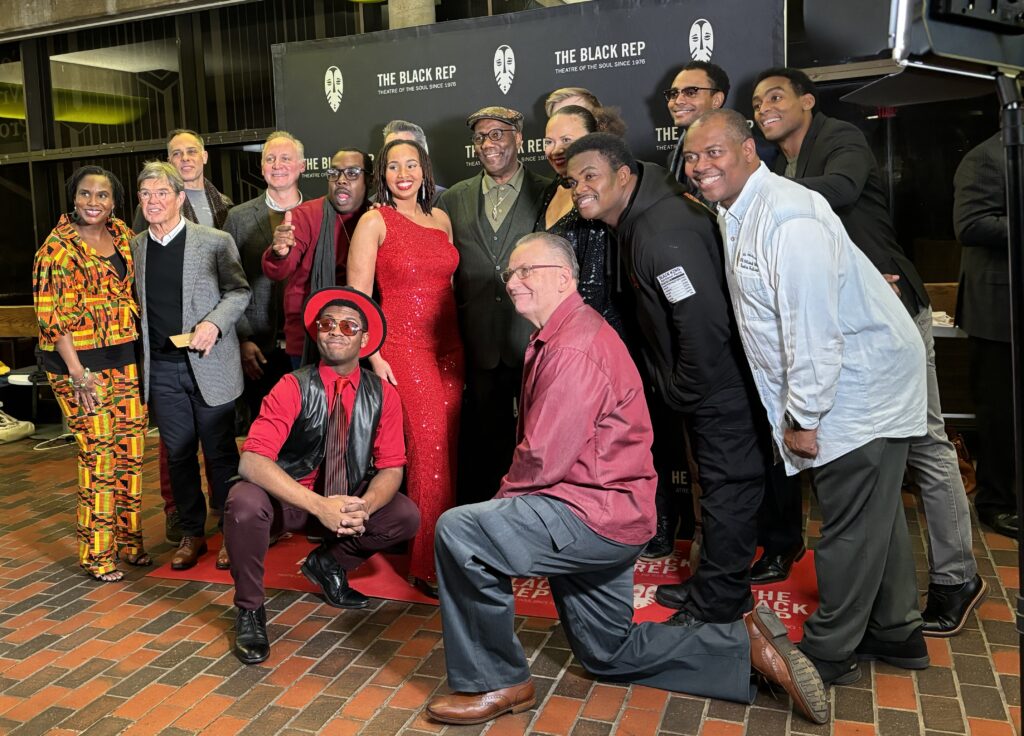
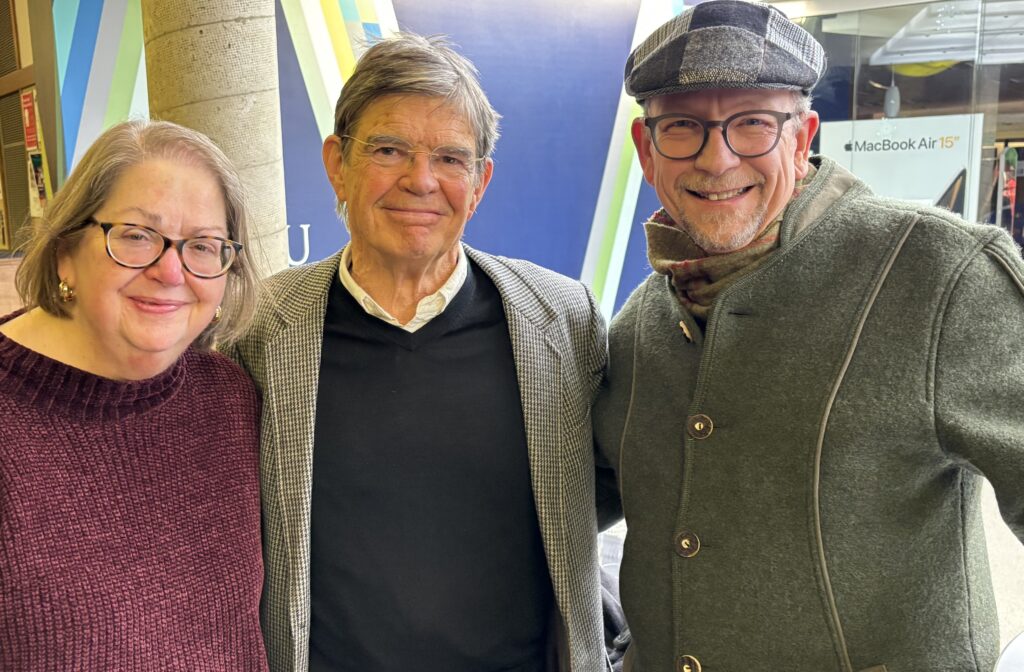

Lynn (Zipfel) Venhaus has had a continuous byline in St. Louis metro region publications since 1978. She writes features and news for Belleville News-Democrat and contributes to St. Louis magazine and other publications.
She is a Rotten Tomatoes-approved film critic, currently reviews films for Webster-Kirkwood Times and KTRS Radio, covers entertainment for PopLifeSTL.com and co-hosts podcast PopLifeSTL.com…Presents.
She is a member of Critics Choice Association, where she serves on the women’s and marketing committees; Alliance of Women Film Journalists; and on the board of the St. Louis Film Critics Association. She is a founding and board member of the St. Louis Theater Circle.
She is retired from teaching journalism/media as an adjunct college instructor.

